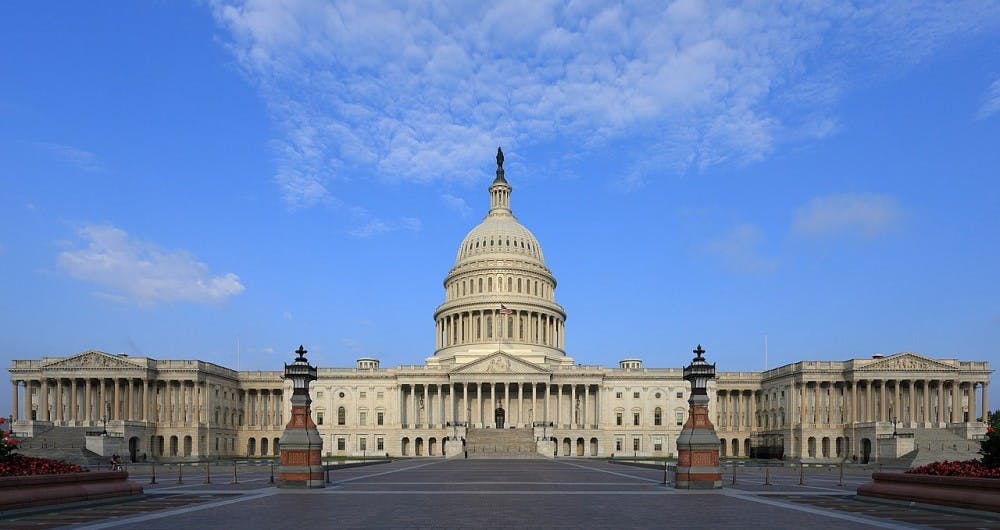The framers of the United States Constitution developed a political system that remains relevant over 200 years after its creation. Although imperfect, the democratic republic envisioned in 1787 has matured into the freest, most successful civilization that has ever existed. However, one of the most pressing issues related to our current state of politics is the existence of the professional politician.
Certain U.S. representatives and senators have held their offices continuously for decades, and while their experience may garner certain benefits, the sustained election of the same politicians introduces challenges to effective governance and policy-making. To remedy this, the states should ratify an amendment to the Constitution in order to limit the amount of terms that Congressmen and Senators can hold.
Professional politicians pose a bipartisan problem to our republic. Senators Patrick Leahy (D-Vt.) and Orrin Hatch (R-Utah) have held their offices since the 1970s. Before they retired in 2017, both John Conyers (D-Mich.) and Charles Rangel (D-N.Y.) were the longest serving congressmen, with their terms starting in 1965 and 1971 respectively. Currently, Don Young (R-Al.), who assumed office in 1973, is the most senior member of the House.
One of the most significant problems related to the professionalization of politics is that it limits the skill sets represented in Washington. Recent legislation drafted by Congress affecting healthcare and education illustrates the failure of current politicians to grasp the complexity of those issues and develop effective solutions to improve them. Additionally, recent Senate investigations into Facebook exposed certain policymakers’ unawareness of how the internet and social media function. With challenges and threats to our nation quickly developing and evolving, Congress needs fresh perspectives from a variety of backgrounds to draft effective policy.
Instead of spending the majority of their working years in Washington, our representatives should instead build up outside experience, enter politics for a finite amount of time while equipped with the perspective of an average citizen, and then leave their offices, giving voters an opportunity to elect a different representative.
Competition encourages the best to succeed in virtually every application. Just as Congress saw it necessary to introduce anti-trust legislation in the late 19th century to break up monopolies in industry and supply chain management that prevented competition from entering the market, voters must demand term limits to disrupt the monopolies that professional politicians hold on the offices they occupy and the political process.
They benefit from name recognition and connections with donors and networks that political newcomers do not have access to exclude the average citizen from the political process. Although opponents to term limits, such as current Senate Majority Leader Mitch McConnell (R-Ky.), argue that re-election itself ensures accountability to voters and functions as a de facto term limit, recent re-election rates demonstrate how the accrual of familiarity and networks in the political world insulate certain elected officials from competition.
Voters should have the choice of electing the person they deem best to represent them in Washington. However, limiting the amount of terms an elected official can serve has been our nation’s modus operandi since the beginning of its executive branch. George Washington set the precedent of stepping down from power after two terms of executive leadership, and every president except Franklin Roosevelt has upheld that tradition. In fact, it was Franklin’s election to four terms as president that spurred Congress to pass the 22nd Amendment limiting the presidential term limit to two terms. Additionally, the Commonwealth of Virginia forbids its governors from serving consecutive terms — the only state in America to do so. The regular transfer of power is a hallmark of a healthy democracy and acts as a safeguard against tyranny.
Government works best when it represents the interests of the people as a whole instead of the few. Term limits remain popular among voters across the political spectrum, but they threaten Washington’s culture of cronyism and special interest groups — so they remain unlikely to be implemented. The inability of Congress to address lingering issues in our nation has destroyed its reputation among the American people — and rightfully so. In order to strengthen the democratic principles upon which our nation was built and advance the interests of the American people as a whole, the Constitution should limit the number of terms members of the House of Representatives and Senate can serve, as it does the President.
Thomas Ferguson is an Opinion Columnist for The Cavalier Daily. He can be reached at t.ferguson@cavalierdaily.com.





